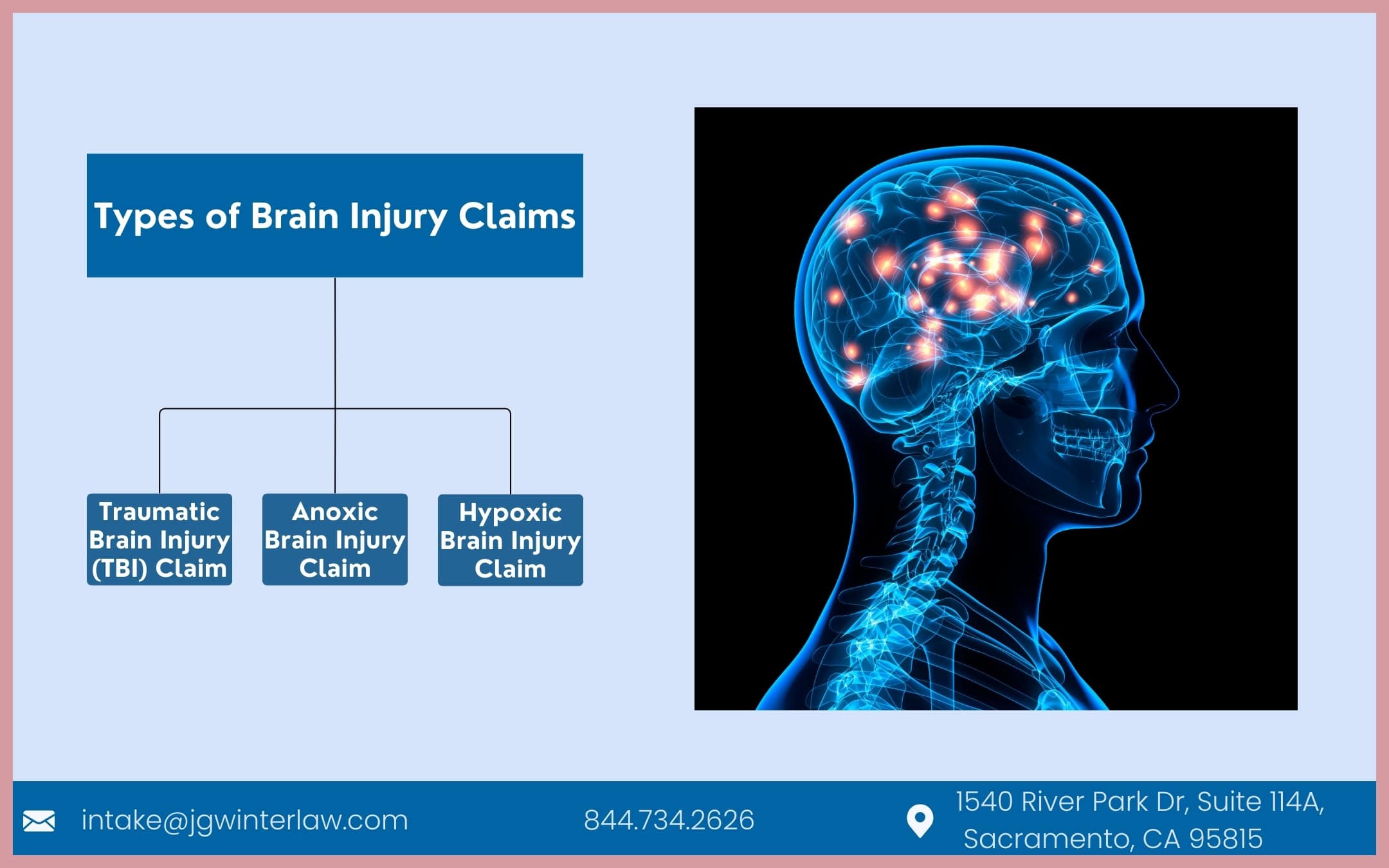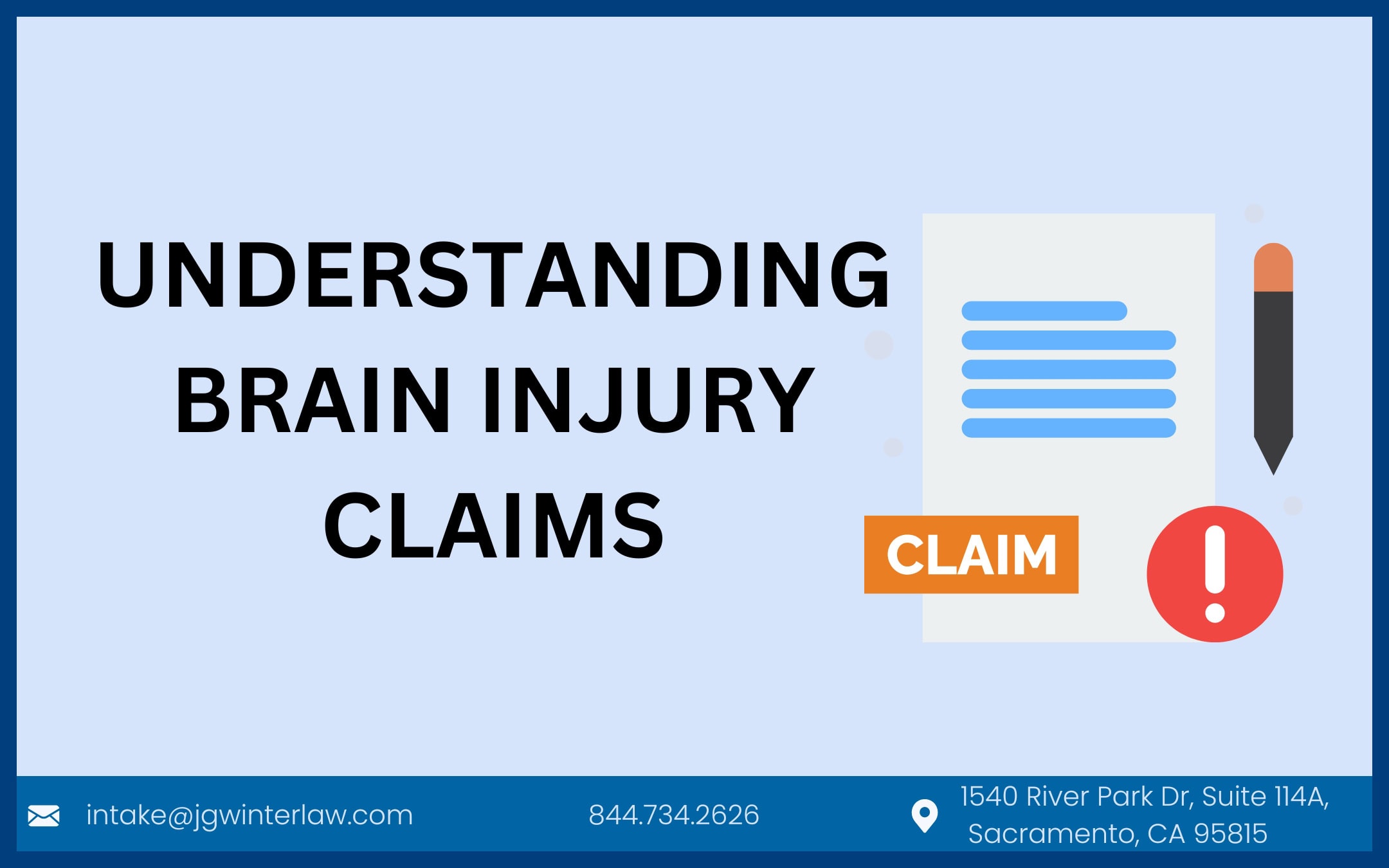Understanding brain injury claims is very important, as brain injuries can have devastating impacts on victims and their families. Ranging from mild concussions to severe trauma, these injuries often lead to significant medical challenges and profound life changes.
A brain injury lawyer can help you recognize the profound consequences of brain injuries. They guide you through the process and fight for you to protect your rights and maximize your compensation. JG Winter Law ensures you receive the knowledgeable representation you deserve.
What constitutes a brain injury?
A brain injury occurs when external forces cause brain dysfunction, typically from a blow to the head or a sudden jolt. It can range from a mild concussion, which may result in temporary disorientation or unconsciousness, to severe traumatic brain injuries that can cause prolonged or permanent impairment in cognitive, physical, or emotional functions.
Brain injuries can arise from various incidents, including car accidents, falls, sports injuries, or violent assaults. Understanding the extent and impact of such injuries is crucial to shaping the approach to treatment and compensation.
Types of brain injury claims

Brain injury claims are categorized based on the nature and cause of the injury. These legal claims ensure you receive compensation for medical expenses, lost wages, and other damages resulting from brain injuries. Below are listed some common types of brain injury claims.
Traumatic Brain Injury (TBI) claim
Traumatic Brain Injury (TBI) claims arise when an external force, such as a blow to the head, causes brain dysfunction. TBIs range from mild concussions to severe brain damage. You can seek compensation for medical treatment, long-term care, and other related expenses.
Anoxic brain injury claim
Anoxic brain injuries occur when the brain is deprived of oxygen. Causes can include drowning, choking, or medical errors during surgery. Anoxic brain injury claims focus on recovering costs for life-sustaining treatments and rehabilitation.
Hypoxic brain injury claim
Hypoxic brain injuries result from a partial reduction in oxygen supply, leading to cognitive and physical impairments. These claims often involve incidents where negligent actions reduced oxygen flow, such as in birth injuries or smoke inhalation accidents. Compensation typically covers ongoing therapy and loss of life quality.
Brain injury symptoms and recovery
Understanding the symptoms of brain injuries is crucial for early diagnosis and effective recovery. Brain injuries can manifest through various signs, depending on the severity and area of the brain affected.
- Difficulty in understanding or processing information.
- Short-term memory issues are prevalent.
- Persistent or severe headaches that do not ease.
- Feeling unsteady on your feet.
- Experiencing discomfort or pain from everyday noises or brightness.
- Sudden mood swings or changes in personality.
- Feeling more tired than usual, even without physical activity.
Financial burdens and emotional strain of brain injuries
Brain injuries often lead to significant financial and emotional challenges. The costs can be overwhelming, including extensive medical bills for emergency treatment, ongoing rehabilitation, and sometimes lifelong care. Additionally, victims may lose income if they’re unable to return to work, adding financial strain to their families.
Brain injuries can also emotionally impact the victims and their loved ones. It often involves long-term psychological support due to changes in personality. Depression and anxiety are also common after severe brain injuries.
Recoverable compensation for brain injury claims
You must understand the types of recoverable damages to secure the compensation you deserve. Brain injury damages typically cover all the financial and personal losses experienced due to the injury.
Economic damage
Economic damages compensate for the financial losses directly related to the injury. These typically include:
- Medical expenses: Costs for emergency care, surgery, medication, and rehabilitation.
- Lost wages: Income lost due to time off work for recovery.
- Future earnings: Projected income losses due to reduced capacity to work.
- Home modification costs: Expenses for necessary changes to accommodate disabilities.
Non-economic damage
Non-economic damages cover the less tangible yet profound impacts of a brain injury. Commonly included are:
- Pain and suffering: Compensation for physical and mental anguish resulting from the injury.
- Loss of life quality: For changes that prevent individuals from enjoying their previous lifestyle.
- Emotional distress: For psychological impacts such as anxiety, depression, and loss of companionship.
Punitive damage
Punitive damages are awarded to punish the defendant for particularly reckless or malicious behavior that led to the injury. These are not tied directly to the losses suffered but are intended to deter similar conduct in the future.
The process of filing a brain injury claim
Filing a brain injury claim involves several critical steps. One must account for all aspects of the injury and ensure the compensation reflects the true cost of the damages. Understanding the process of filing a brain injury claim is crucial to securing the justice and compensation you deserve.
Initial consultation: You need to consult a personal injury lawyer to discuss the specifics of your case. They clarify the details of your injuries and the potential for your claim.
Gathering evidence: Compiling evidence, including medical records, witness statements, and any other documentation, supports your claim.
Calculating damages: Determine the extent of financial and non-financial. It involves quantifying medical expenses, lost wages, and other related costs.
Negotiating settlements: Before filing a lawsuit, there is often a phase where the lawyer tries to negotiate a settlement with the opposing party or insurance company to obtain fair compensation.
Filing a lawsuit: If a settlement cannot be reached, you file a lawsuit in court. It starts the legal process towards a trial or judgment, where a judge or jury can decide on the compensation.
Challenges in brain injury claims
Brain injury claims are complex and challenging, primarily due to the intricacies of proving the extent and causation of injuries. These challenges often make it difficult for victims to secure appropriate compensation.
Proving causation: Demonstrating the direct link between the incident and the brain injury can be challenging, especially when symptoms are delayed.
Assessing long-term impact: Brain injuries can have progressive symptoms. It makes it difficult to fully assess their long-term impact early in the claim process.
Quantifying non-economic damages: Emotional distress and pain and suffering are significant in brain injury cases but hard to quantify.
The law offices of J.G. Winter can help in your case

Attorney Jeremy Winter specializes in handling complex brain injury claims. Our brain injury lawyers advocate for you – they strategically navigate challenges associated with brain injury claims. They help you receive the compensation necessary for recovery and adjustment to life post-injury. Contact us today for personalized guidance on your case.
FAQs on understanding brain injury claims
What is a brain injury claim?
A brain injury claim is a legal action you take to seek compensation for your brain injuries due to someone else’ negligence or intentional harm. The claim potentially cover your medical expenses, lost wages, pain and suffering, and other related costs.
How much compensation do you get for brain injury?
The compensation for a brain injury can vary widely based on the injury’s severity, impact on quality of life, and the costs incurred. Settlements can range from thousands to millions of dollars, depending on the specific circumstances of the case.
How to explain a brain injury disability?
A brain injury disability is a condition where the brain’s normal function is impaired due to an injury, affecting cognitive, physical, and emotional capabilities. It can lead to various disabilities, depending on which part of the brain is affected.
What are the three main types of head injuries?
The three main types of head injuries are:
- Skull fractures: Breaks in the skull bone, which can lead to additional brain injuries.
- Concussions: Often caused by a direct blow to the head, leading to temporary loss of brain function.
- Contusions: Bruising or bleeding of the brain itself.


